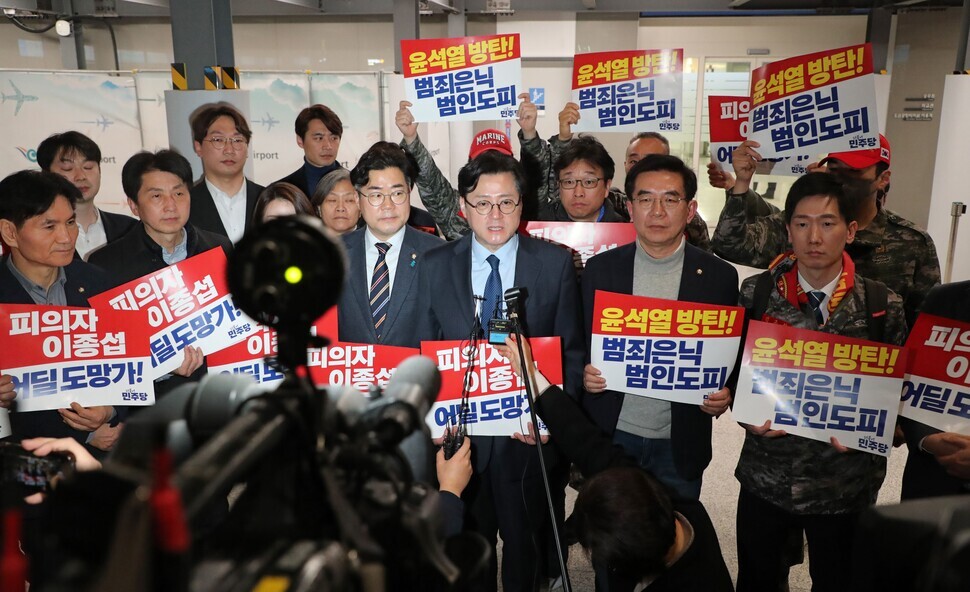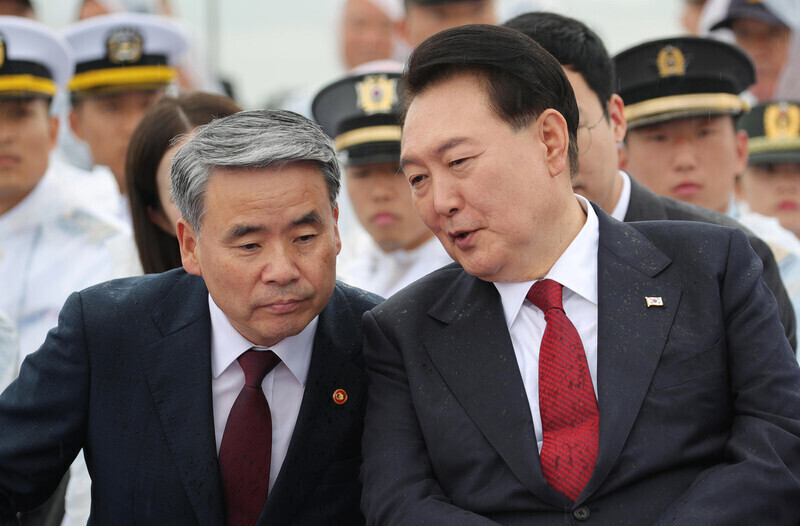hankyoreh
Links to other country sites 다른 나라 사이트 링크
Former defense minister slips out of country during criminal investigation involving dead marine

Former Korean Defense Minister Lee Jong-sup, aged 64, slipped out of the country to Australia amid criticism that he is a fugitive from the law. Lee has been the main suspect in allegations about external pressure on the investigation of the death of a marine corporal during a search for missing people after torrential rains last July.
Lee left Korea just six days after he was named ambassador to Australia by Korean President Yoon Suk-yeol on Mar. 4, and just three days after he was called in for questioning by the Corruption Investigation Office for High-ranking Officials (CIO). The flight of a key suspect overseas, ostensibly on public business, is almost certain to disrupt the criminal investigation.
The president has the option of appointing people like Lee who are not career diplomats to serve as ambassadors and other senior diplomats. Such specially appointed diplomats are not bound by the typical age of retirement for career diplomats (60 years), nor do they have a set term in office.
Following his appointment as the ambassador on Mar. 4, Lee departed from Incheon Airport at 7:45 pm on Sunday on Korean Air flight KE407 bound for Brisbane, Australia.

Opposition party lawmakers and members of the fraternal association of the marines who visited the airport on Sunday to keep Lee from traveling to Australia were watching five doors leading to the departures section of the airport from four hours before the flight was set to depart, but Lee somehow managed to evade the marines and on-site journalists to board the plane.
“There are no other ways [to get to the departures section] than these [five doors],” an airport employee said.
Hong Ihk-pyo, floor leader of the Democratic Party, was at the airport along with 30 members of the Democratic Party task force organized to reveal the full truth about the marine corporal’s death.
“We’ve confirmed that [Lee] has already gone through immigration. The president has allowed an individual who is a suspect in a criminal case to flee the country by giving him the status of a diplomat. He may try to delay the investigation and cover up the truth, but [Lee] will certainly face the legal consequences,” Hong declared at 7:15 pm on Sunday.
Lee’s departure from the country was streamlined following his appointment as ambassador. After the media reported that Lee was under a travel ban on Mar. 6, shortly after he was named to the post, he hastily agreed to be questioned by the CIO just one day later, on Mar. 7.
It is typical in criminal investigations to begin with lower-ranking people and then to move up to the higher-ups. That has led to criticism that Lee’s hasty questioning — which took place before prosecutors could even conduct forensic work on seized materials — was intended to provide a pretext for lifting the travel ban on him.
Sure enough, the Ministry of Justice lifted the travel ban on Lee on Mar. 8, just one day after he was questioned.
Lee’s departure from the country places a major obstacle in the path of the investigation into allegations of external pressure.
Lee was the individual who approved a report by the marine investigative team concluding that Lim Seong-geun, commander of the 1st Marine Division, should be handed over to the police on charges of occupational negligence resulting in the death of a marine, only to reverse his decision one day later. As such, he’s seen as the connection who could prove that the president’s anger was behind the alleged external pressure on the investigation.
By Goh Gyoung-ju, staff reporter
Please direct questions or comments to [english@hani.co.kr]

Editorial・opinion
![[Editorial] Intensifying US-China rivalry means Seoul must address uncertainty with Beijing sooner than later [Editorial] Intensifying US-China rivalry means Seoul must address uncertainty with Beijing sooner than later](https://flexible.img.hani.co.kr/flexible/normal/500/300/imgdb/original/2024/0517/8117159322045222.jpg) [Editorial] Intensifying US-China rivalry means Seoul must address uncertainty with Beijing sooner than later
[Editorial] Intensifying US-China rivalry means Seoul must address uncertainty with Beijing sooner than later![[Column] When ‘fairness’ means hate and violence [Column] When ‘fairness’ means hate and violence](https://flexible.img.hani.co.kr/flexible/normal/500/300/imgdb/original/2024/0516/7417158465908824.jpg) [Column] When ‘fairness’ means hate and violence
[Column] When ‘fairness’ means hate and violence- [Editorial] Yoon must stop abusing authority to shield himself from investigation
- [Column] US troop withdrawal from Korea could be the Acheson Line all over
- [Column] How to win back readers who’ve turned to YouTube for news
- [Column] Welcome to the president’s pity party
- [Editorial] Korea must respond firmly to Japan’s attempt to usurp Line
- [Editorial] Transfers of prosecutors investigating Korea’s first lady send chilling message
- [Column] Will Seoul’s ties with Moscow really recover on their own?
- [Column] Samsung’s ‘lost decade’ and Lee Jae-yong’s mismatched chopsticks
Most viewed articles
- 1For new generation of Chinese artists, discontent is disobedience
- 2[Editorial] Transfers of prosecutors investigating Korea’s first lady send chilling message
- 3[Column] US troop withdrawal from Korea could be the Acheson Line all over
- 4[Column] When ‘fairness’ means hate and violence
- 5Xi, Putin ‘oppose acts of military intimidation’ against N. Korea by US in joint statement
- 6[Exclusive] Unearthed memo suggests Gwangju Uprising missing may have been cremated
- 7China calls US tariffs ‘madness,’ warns of full-on trade conflict
- 8[Editorial] Intensifying US-China rivalry means Seoul must address uncertainty with Beijing sooner t
- 9S. Korea “monitoring developments” after report of secret Chinese police station in Seoul
- 10For Korea’s Justice Ministry, no place is sacred from immigration raids